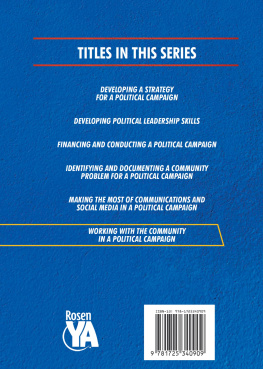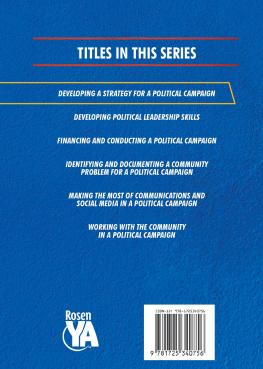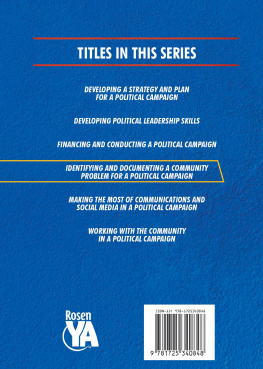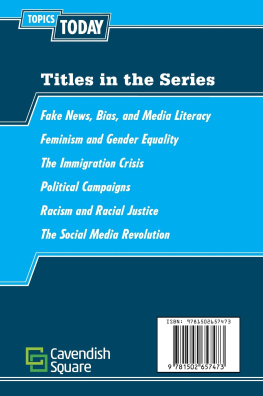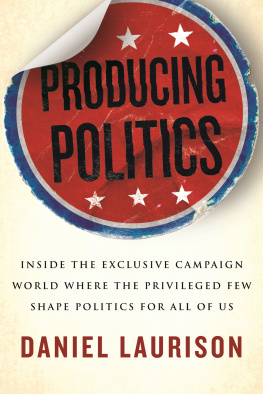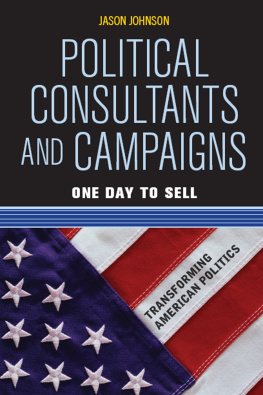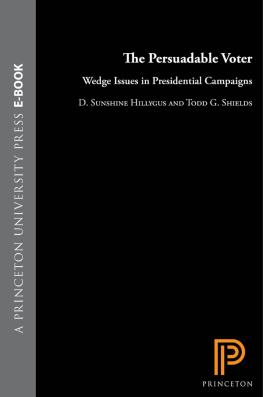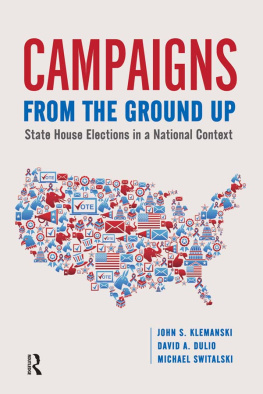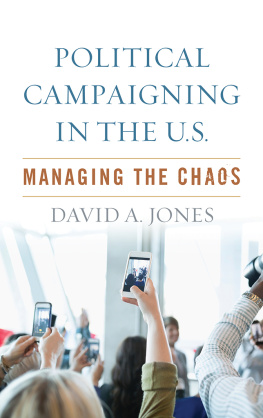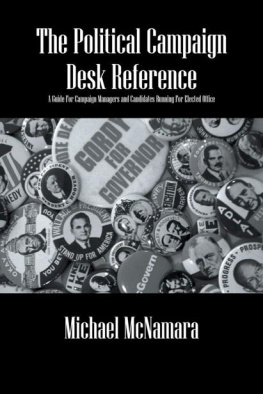
Published in 2020 by The Rosen Publishing Group, Inc.
29 East 21st Street, New York, NY 10010
Copyright 2020 by The Rosen Publishing Group, Inc.
First Edition
All rights reserved. No part of this book may be reproduced in any form without permission in writing from the publisher, except by a reviewer.
Cataloging-in-Publication Data
Names: Banigan, Melissa, author.
Title: Working with the community in a political campaign / Melissa Banigan.
Description: New York: Rosen Publishing, 2020 | Series: Be the change!
: political participation in your community | Includes bibliographical
references and index. | Audience: Grade 7 to 12.
Identifiers: ISBN 9781725340909 (library bound) | ISBN 9781725340893 (pbk.)
Subjects: LCSH: Political campaignsUnited StatesJuvenile literature. | Campaign
managementUnited StatesJuvenile literature. | Political participation
United StatesJuvenile literature. | CommunitiesJuvenile literature.
Classification: LCC JK2281.B34 2020 | DDC 324.720973dc23
Manufactured in the United States of America
CONTENTS
CHAPTER ONE
ITS NOT JUST ABOUT THE CANDIDATE
CHAPTER TWO
HOW TO RECRUIT VOLUNTEERS FOR A POLITICAL CAMPAIGN
CHAPTER THREE
HOW TO MANAGE VOLUNTEERS
CHAPTER FOUR
COMMUNITY EVENTS
CHAPTER FIVE
THE LAWS OF A CAMPAIGN
INTRODUCTION
I n early 1860, Republican presidential candidate Abraham Lincoln was so unknown to potential voters that even he didnt think hed get elected. One evening, however, while giving a speech in Connecticut against slavery, he saw hundreds of enthusiastic young men in the audience and thought that maybe, just maybe, he had a fighting chance.
The men were part of a volunteer brigade of Republicans called the Wide Awakes. Wanting nothing more than to see a fellow Republican elected presidentparticularly one who stood against slaverythousands of Wide Awakes flocked to rallies, speeches, picnics, and other events. They even started escorting Lincoln (and other Republicans) wherever he went. According to historian Bruce Chadwick, who authored a book about Lincolns campaign, each of the passionate young men felt he belonged to a group For the Wide Awakes, the Lincoln campaign was a crusade, not just an election.
Recognizing the collective power of the volunteer brigade, Lincoln encouraged the Wide Awakes to continue their volunteer efforts. Their efforts paid offat a single event in New York, more than nineteen thousand members of the group showed up, and by Election Day there were a whopping five hundred thousand members. While this might not seem like a large number today, its important to keep in mind that in 1860, half a million people amounted to about one-sixtieth of the American population. Today, that would translate to more than five million members of the Wide Awakes!
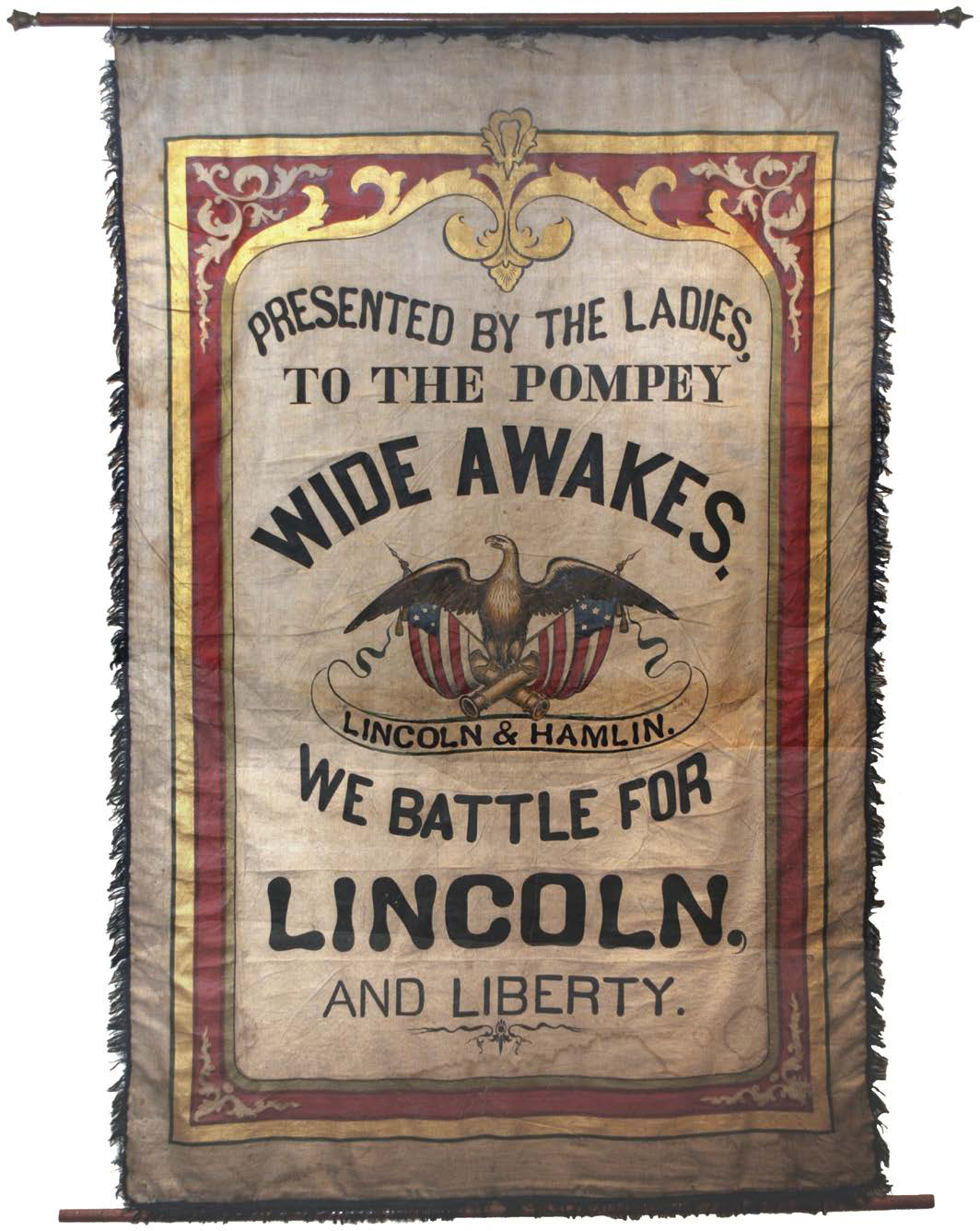
The Wide Awakes, a volunteer brigade of young men, helped Abraham Lincoln get elected president of the United States.
One of the largest archives in American History, the Gilder Lehrman Collection, stated that the Wide Awakes are credited with helping Abraham Lincoln win the nomination for President of the United States. They did this by enthusiastically showing up, spreading the word that Lincoln was a great candidate, and making communities feel that they had a large stake in the election.
There are two big lessons to be learned from the Wide Awakes: political candidates are only as powerful as the contingents of volunteers fighting to help them win elections; and communities must be engaged with a campaign and inspired to vote.
In some ways, Lincoln had it pretty easythe Wide Awakes had not only organized independently of his campaign, but they also convinced communities in many cities to head to the voting polls. This meant that all Lincoln had to do was provide them with a little encouragement.
Most candidates, however, dont have it so easy. Usually, passionate volunteers like the Wide Awakes dont just show up on their own, ready to inspire people to vote. Campaigns need to recruit, train, and dispatch volunteers into local communities to engage with potential voters.
Above all else, political campaigns must focus on delivering results for communities. In 1860, the young men involved with the Wide Awakes envisioned a country where all people were free from the shackles of slavery. They felt strongly that Abraham Lincoln was the person to get the job done. And they were correct. In 1863, President Lincoln issued an executive order called the Emancipation Proclamation, which promised to end slavery across the United States. Two years later, after the Civil War ended, the Thirteenth Amendment to the United States Constitution forever abolished slavery in America.
Not every politician has as big a job as ending slavery, but all communities have needs. The best political campaignsand the campaigns that win electionsstrive to meet those needs.

ITS NOT JUST ABOUT THE CANDIDATE
J ust a few months before the release of Christopher Nolans second Batman movie, a website was launched to promote an ad campaign for the films fictional political candidate, Harvey Dent. Dentor rather, an actor playing Dentalso called people who had registered their phone numbers with the site. He said:
We all know whats wrong with Gotham. Crime is out of control, and instead of protecting our streets, too many cops have become criminals themselves. This is why my mission has been to stamp out police corruption. And this is why Im considering a run for District Attorney. But I cant do it alone. I need to know if you, the people of Gotham, want change. Do you want a Gotham free from the grip of criminals and the corrupt? Are you ready to join a crusade to take back our city?
The ad campaign was meant to convince people to see the new Batman movie rather than actually get them to vote for a fictional character, but the message tapped into the single most important element of a political campaign: teamwork. I cant do it alone, said Dent, and indeed, political candidates are only as strong as the communities that support their campaigns and the electorates (eligible people allowed to vote) who vote them into office.
WONT YOU BE MY NEIGHBOR?
Fred Rogerswho developed and starred in the television show Mister Rogers Neighborhood famously asked his audience, Wont you be my neighbor? His show explored relationships with many of the people who make up a communityhis local mail carrier, firefighter, phone operator, and chef, for example. Hed invite them into his television house, ask them about their lives, and speak with them about their ideas. One of the characters on his show, Mayor Maggie, even spoke with other characters in sign language.
In Mister Rogers Neighborhood, learning how to communicate well with others was the best way to be a good neighbor. Political campaigns can learn a lot from the lessons taught in the show. After all, for a political campaign to help a candidate win an election, its important to not only know who lives within the communities, but what makes them tick.
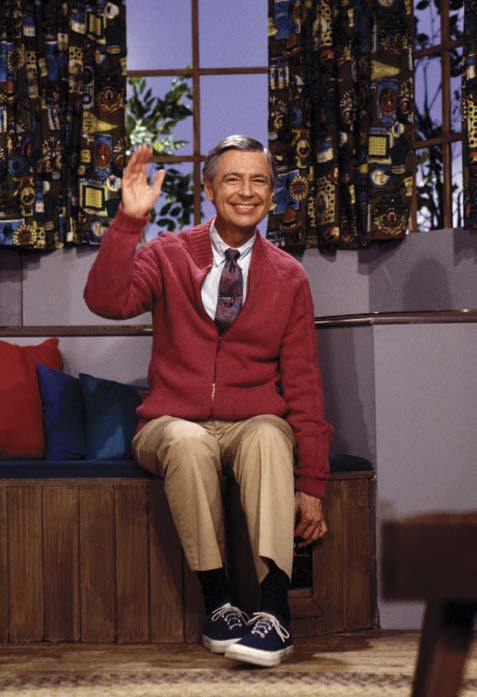
Political candidates should ask the same question Mr. Rogers asked on his show,

